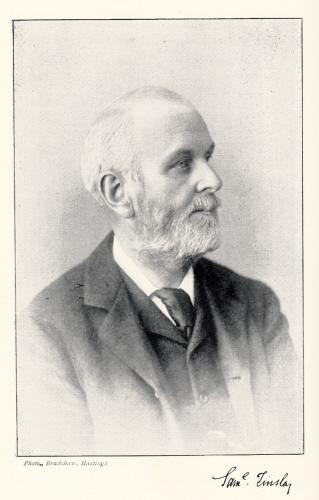
Edward Winter
Section 1: Samuel Tinsley (1847-1903)

Samuel Tinsley (opposite page 29 of the Hastings, 1895 tournament book edited by Horace F. Cheshire)
Pierre Bourget (Quebec, Canada) supplies a depiction of the London, 1899 tournament, from page 11 of the Montreal Weekly Witness, 18 July 1899:
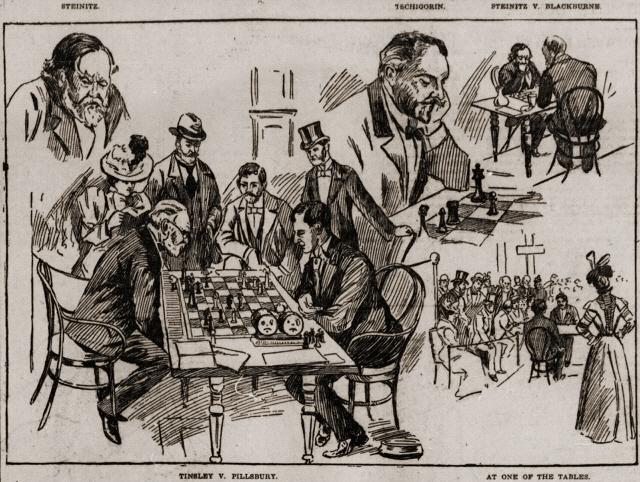
(5741)
Regarding early chess books written for young players, Michael Clapham (Ipswich, England) shows, courtesy of the Cleveland Public Library, Six Chess Lessons for Junior Players by S. Tinsley (Stroud, 1893):
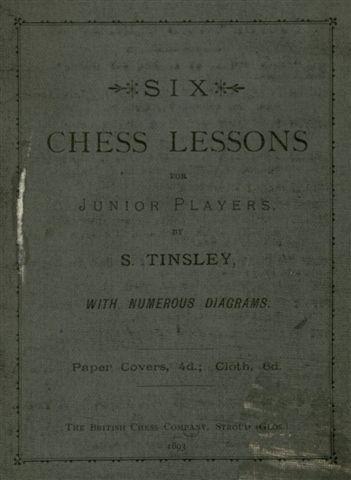
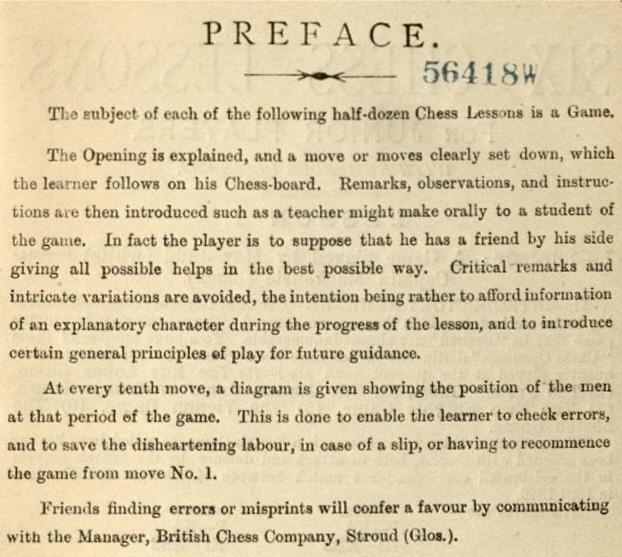
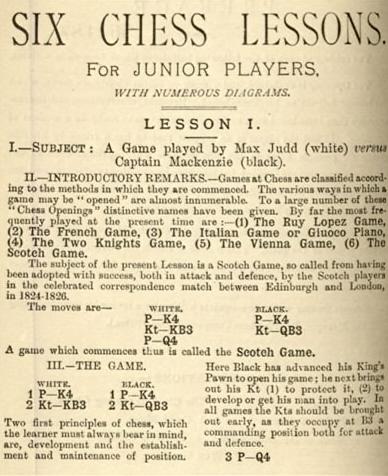
(8383)
A comment by William Lombardy on page 121 of the April 1969 Chess Review:
‘Tinsley has said: “Knight on the rim equals trim.”’
Lombardy also quoted the ‘trim’ wording on page 134 of Modern Chess Opening Traps (New York, 1972), adding ‘Tinsley, circa 1880’. On what basis?
(8718)
The obituary of Samuel Tinsley on pages 158-159 of the April 1903 BCM reported:
‘The mortal remains of Mr Tinsley were interred on 4 March at Lewisham Cemetery, after a service at Lewisham Road Baptist Church, into which the body, enclosed in an English oak panelled coffin with brass fittings, was borne on the shoulders of deceased’s sons, Messrs. Edward, Samuel, Henry and Frank Tinsley.’
(8725)
Page 172 of Chess: Man vs Machine by Bradley Ewart (London, 1980) has a detail of Samuel Tinsley from a painting by Anthony Rosenbaum owned by the National Portrait Gallery, London. Tinsley’s game against Mephisto, given by Ewart on pages 171-173, was annotated by Steinitz in The Field, 20 April 1878.
An article by Samuel Tinsley, ‘Problematic Coincidences’, was published on pages 466-471 of the May 1899 American Chess Magazine.
It includes the following on page 470:
‘The man who can be mean enough to stoop to such traffic as palming off on chess editors and players something as his own, which he has obviously merely taken from a book, is only worthy of contempt.’
See also Copying and The Chess Writer P. Wenman.
In The Times of 21 September 1937, page 16, Capablanca wrote from Baden about the late E.S. Tinsley’s contribution to chess:
‘He did, perhaps, more than anybody else to develop the interest for good chess in England, and he devoted a great deal of time and energy to give the readers of The Times as good and accurate a chess column as could be found anywhere.’
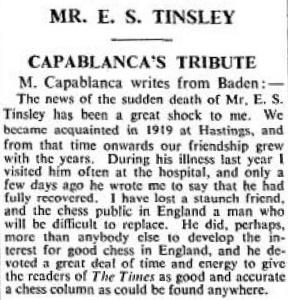
(45)
Frank Skoff (Chicago, IL, USA) writes:
‘The Cuban is quite polite and conventional ... He says nothing as to the strength of Tinsley as a player or as an analyst. Have other grandmasters or masters expressed any views as to Tinsley’s strength?’
Page 195 of Arpad E. Elo’s The Rating of Chessplayers Past & Present (London, 1978) lists Edward S. Tinsley 1869-1937 and gives him a best five-year average rating of 2400. We cannot believe this and feel there must be a mix-up by Elo over the father and son.
(719)
From Gordon Pollard (Wallingford, England):
‘Mention of the Tinsleys reminds me that E.S. Tinsley liked county secretaries to send him detailed reports of Saturday county matches via passenger train, so that he could collect them at London termini on Sunday morning; a full report of the matches would then appear in The Times on Monday morning. Fifty years ago when I was Secretary of the Somerset Chess Association, there was one occasion when the railway telegraph clerk charged me half-a-crown instead of the usual ninepence for my packet addressed to Tinsley. As my last train for home was about to depart from the far side of the station, I paid the half-crown and crossed the bridge at the double and just managed to board the train as it pulled out. A couple of days later Tinsley wrote telling me off for paying half-a-crown, – had I never heard of a ninepenny news stamp? When I explained the circumstances he said that The Times wouldn’t let the railway company get away with that, and six months later I had a letter of apology from the GWR and a refund of one-and-ninepence.’
(106)
From page xvi of Lessons from My Games by Reuben Fine (New York, 1958):
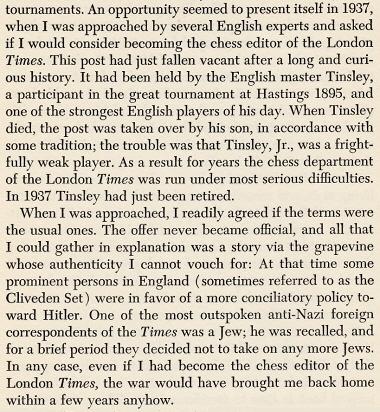
In 1937 Edward Samuel Tinsley had not ‘just been retired’. He died.
(593)
Our archives contain, courtesy of the Manhattan Chess Club, a copy of a letter dated 10 August 1930 to Capablanca from E.S. Tinsley, the chess correspondent of The Times (London). After discussing the world championship rematch negotiations and whether Alekhine might participate at the next Hastings tournament, Tinsley wrote:
‘... Did I tell you that Wahltuch started talking to me about A[lekhine] saying he had asked him whether he would like to play the return match with you in England. A.’s reply was that he would not, as he did not think the English press was sympathetic towards himself! Then W. said to me, “You have something against him?” I said, “Yes, I have, and so have The Times, as he committed the unforgivable sin, so far as they are concerned. He will get justice from us, as Champion of the World, but nothing more.” And Wahltuch had not the face to ask me exactly what it was, perhaps he knew! If he did, he knew what a fool Alekhine had been, as he would be under no illusions as to what a bribe meant to our people. The roguery was in throwing over his own friend, so soon as he realized our attitude in the matter.’
To what is Tinsley referring?
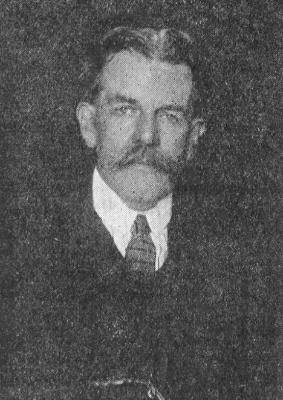
Edward Samuel Tinsley (BCM, October 1925, page 412)
(1997)
Some mordant comments by Purdy from page 89 of the July-August-September 1966 Chess World:
‘The worst annotator of all time was Tinsley, who used to edit the chess column of the London Times Weekly [sic] in my boyhood and quite a long time after that. His father was S. Tinsley (an expert who played at Hastings, 1895), and when the father died, the son came along with copy as usual. The management (not chessplayers) took him on, and paid him good money for gibberish over several decades till at long last he died, regretted by none of the many chess-playing readers of The Times in the far-flung outposts of the Empire.
He earned the curses of the chess world, and many players would have reserved him a special corner of Hell where he could receive his weekly cheques as usual but never cash them through all eternity.’
(2742)
From Taylor Kingston (Shelburne, VT, USA):
‘Reading the new Najdorf: Life and Games I noticed this improbable anecdote on page 251:
“It was during the same Margate congress [i.e. 1939] that Najdorf received a compliment from Samuel Tinsley: ‘Mr Najdorf, your play is most insouciant.’ Taking this unfamiliar word to mean something like careless instead of carefree, Najdorf retorted angrily: ‘Are you insulting me?’”
Samuel Tinsley, chess columnist for The Times, died in 1903. Gaige’s Chess Personalia lists also an Edward Samuel Tinsley (a son, perhaps?), but he died in 1937. Thus attendance by either at Margate, 1939 seems unlikely.
Was there yet another Samuel Tinsley, or is this just another “good story”?’
That Edward Tinsley (1869-1937) was the son of Samuel Tinsley (1847-1903) is a fact (see, for instance, page 503 of the October 1937 BCM and page 327 of A Chess Omnibus). The BCM item stated regarding Edward Tinsley:
‘After the death of his father in 1903 he and his two brothers took over the chess work for The Times, and their collaboration continued until 1912, when Edward took full charge.’
As noted on page 147 of A Chess Omnibus, in January 1926 a radio presentation about chess on the British Broadcasting Company was made by ‘Mr S. Tinsley’, a brother of Edward. His forename was Samuel (BCM, April 1903, page 159), but we do not know whether he was still alive in 1939, whether he was the person who spoke to Najdorf or, indeed, whether the alleged 1939 exchanges occurred at all.
(3799)
Justin Horton (Huesca, Spain) wonders who was being referred to by Gerald Abrahams in the following paragraph from page 115 of his book Not Only Chess (London, 1974):
‘The computer, however, has no judgement, except the arithmetical. They say of the computer that if it has to choose between two clocks, it prefers the one that has stopped to the one that loses a second a day, because the former is accurate twice a day and the other is only accurate after many days. In this the computer resembles an unlamented Times correspondent who reviewed the position at the adjournment in a Hastings Congress. On each of five boards he predicted victory for the player with the pawn to the good. In every case that player lost.’
The name of E.S. Tinsley naturally comes to mind (see pages 245 and 272 of Chess Explorations), but we know nothing about the specific accusation made by Abrahams.
(4557)
E.S. Tinsley is visible in a Liège, 1930 group photograph. See C.N. 5070.
C.N. 8725 referred to William Winter’s criticisms of E.S. Tinsley, which were first quoted in C.N. 1197. The relevant pages of CHESS are given below:
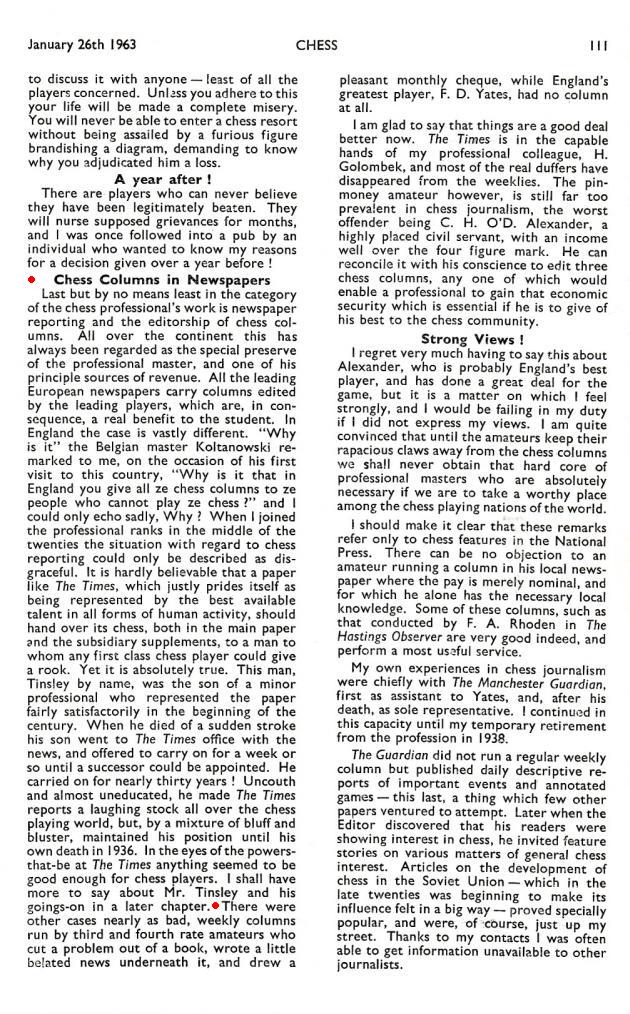
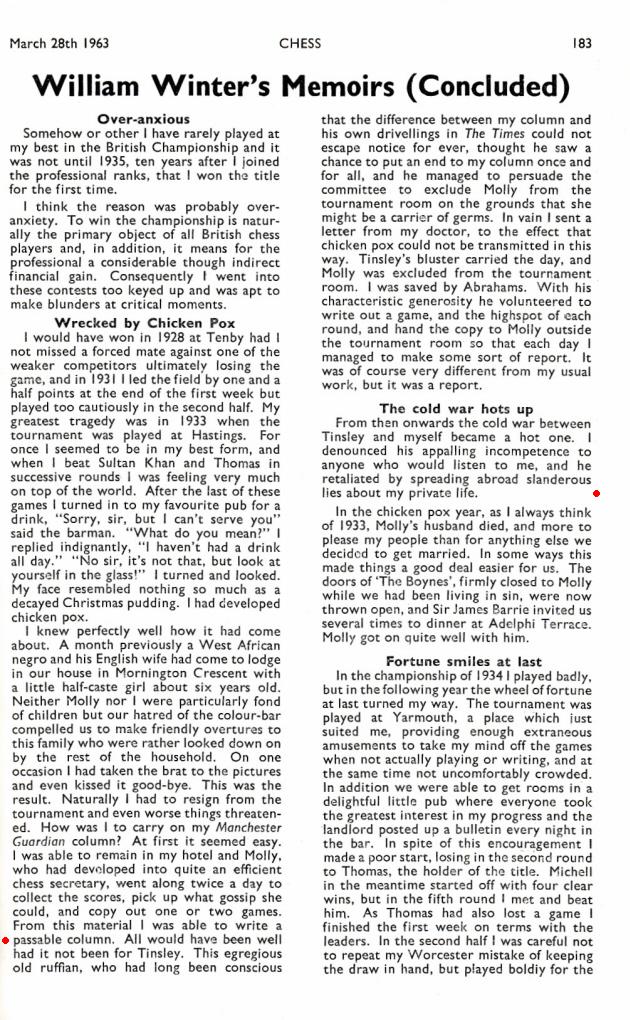
(8739)
Page 503 of the October 1937 BCM published an obituary of Edward Tinsley:
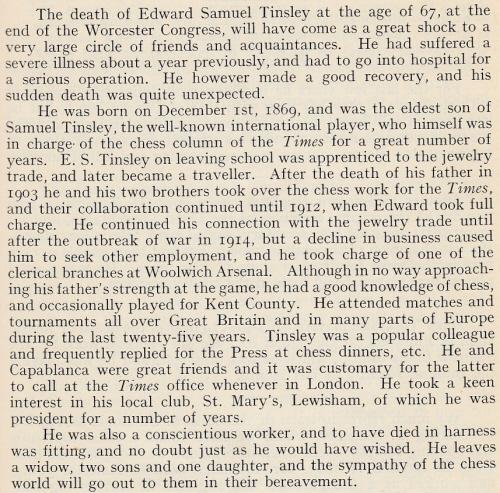
(8725)
An extract from the article by G.H. Diggle referred to in C.N. 8725 (first published in the June 1979 issue of Newsflash), concerning Edward Samuel Tinsley:
‘He was a well-known character at chess congresses between the Wars – a dignified, florid, slightly ponderous man, with notebook in hand and pencil poised at the ready, wandering from board to board like “the friendly cow, all red and white” and compiling such mildly censorious thunder as “X went sadly astray on the tenth move” or “Y appeared completely unfamiliar with this line of play”. He had his detractors, as his own chess achievements were something of a mystery; and congress cynics whose play he had criticized reacted sometimes with jocular slanders about “old Tinsley”, comparing him with the celebrated public school games master who stood on the brink of the swimming bath upbraiding his struggling pupils until one day he fell in himself, couldn’t swim a yard, and had to be fished out. But the truth was, as the BCM obituary put it, that “although in no way approaching his father’s strength at the game, he had a good knowledge of chess, and occasionally played for Kent County”. One master who greatly respected him was Capablanca, who always called at the Times office whenever he was in London. Tinsley always demanded of himself nothing less than 100% accuracy when reporting a congress; the BM once heard him “trumpet loud and long” when a colleague had furnished him with an incorrect result, though the game in question was in a third-class section. His death was tragically sudden – he was actually reporting the Centenary Congress of the Worcester C.C. when he collapsed when the last round was in progress; the players were kept in ignorance until the games were over, and the presentation of the prizes cancelled as a mark of respect.’
(8794)
As mentioned on page 99 of our book on Capablanca, E.S. Tinsley drew with the Cuban in a simultaneous display at the Gambit Chess Rooms, London on 18 September 1919 (BCM, October 1919, page 342). The report below appeared in The Times, 19 September 1919, page 8:
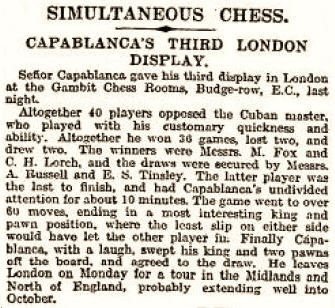
The game was misdated ‘1918’ in three editions of Capablanca’s games compiled by Rogelio Caparrós (Yorklyn, 1991, Barcelona, 1993 and Dallas, 1994). The score was also given on pages 245-247 of Capablanca in the United Kingdom (1911-1920) by V. Fiala (Olomouc, 2006), from The Times Weekly Edition, 10 October 1919.
Below we now show that column by E.S. Tinsley (page iv):
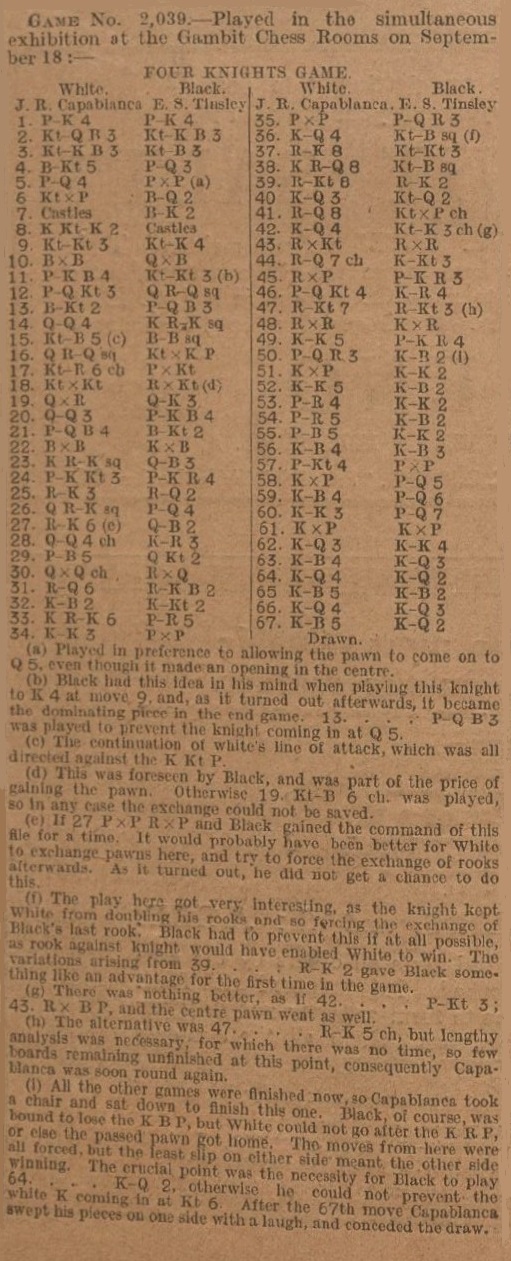
The column has been forwarded to us by Eduardo Bauzá Mercére (New York, NY, USA), courtesy of the New York Public Library (General Research Division).
In the Fiala book there were, of course, a few mistranscriptions of the Times Weekly Edition annotations. Moreover, Tinsley gave White’s second move as Nc3, and not Nf3.
1 e4 e5 2 Nc3 Nf6 3 Nf3 Nc6 4 Bb5 d6 5 d4 exd4 6 Nxd4 Bd7 7 O-O Be7 8 Nde2 O-O 9 Ng3 Ne5 10 Bxd7 Qxd7 11 f4 Ng6 12 b3 Rad8 13 Bb2 c6 14 Qd4 Rfe8 15 Nf5 Bf8 16 Rad1 Nxe4
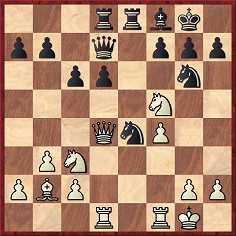
17 Nh6+ gxh6 18 Nxe4 Rxe4 19 Qxe4 Qe6 20 Qd3 f5 21 c4 Bg7 22 Bxg7 Kxg7 23 Rfe1 Qf6 24 g3 h5 25 Re3 Rd7 26 Rde1 d5 27 Re6 Qf7 28 Qd4+ Kh6 29 c5 Qg7 30 Qxg7+ Rxg7 31 Rd6 Rf7 32 Kf2 Kg7 33 Ree6 h4 34 Ke3 hxg3 35 hxg3 a6 36 Kd4 Nf8 37 Re8 Ng6 38 Red8 Nf8 39 Rb8 Re7 40 Kd3 Nd7 41 Rd8 Nxc5+ 42 Kd4 Ne6+ 43 Rxe6 Rxe6 44 Rd7+ Kg6 45 Rxb7 h6 46 b4 Kh5 47 Rg7 Rg6 48 Rxg6 Kxg6 49 Ke5 h5 50 a3 Kf7 51 Kxf5 Ke7 52 Ke5 Kf7 53 a4 Ke7 54 a5 Kf7 55 f5 Ke7 56 Kf4 Kf6 57 g4
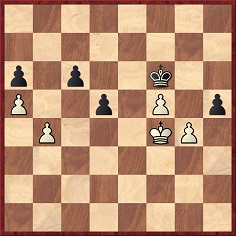
57...hxg4 58 Kxg4 d4 59 Kf4 d3 60 Ke3 d2 61 Kxd2 Kxf5 62 Kd3 Ke5 63 Kc4 Kd6 64 Kd4 Kd7 65 Kc5 Kc7 66 Kd4 Kd6 67 Kc4 Kd7 Drawn.
Concerning the position in the second diagram, in a letter to us dated 3 June 1991 G.H. Diggle (then aged 88) diffidently suggested that Tinsley had missed a win by not playing 57...h4. That is confirmed by a computer check, which also indicates that Capablanca erred with 56 Kf4 (instead of 56 f5+, which draws).
(11853)
William D. Rubinstein (Melbourne, Australia) writes:
‘According to the probate records, available on ancestry.co.uk, Edward Samuel Tinsley of 194 Algernon Eoad, Lewisham, Kent died on 11 September 1937 at the Public Hall, Worcester. Administration of his estate (i.e. he left no will) was granted to his widow, Emelie Kate Tinsley, and was valued at £205.’
From E.S. Tinsley’s death notice on page 1 of CHESS, 14 September 1937:
‘His flowing white moustache and stately bearing will be remembered with affection by thousands of chess enthusiasts not only in Great Britain but also on the Continent and in America, for he travelled widely to the various chess events.’
A letter dated 10 May 1931 from E.S. Tinsley to Hermann Helms:
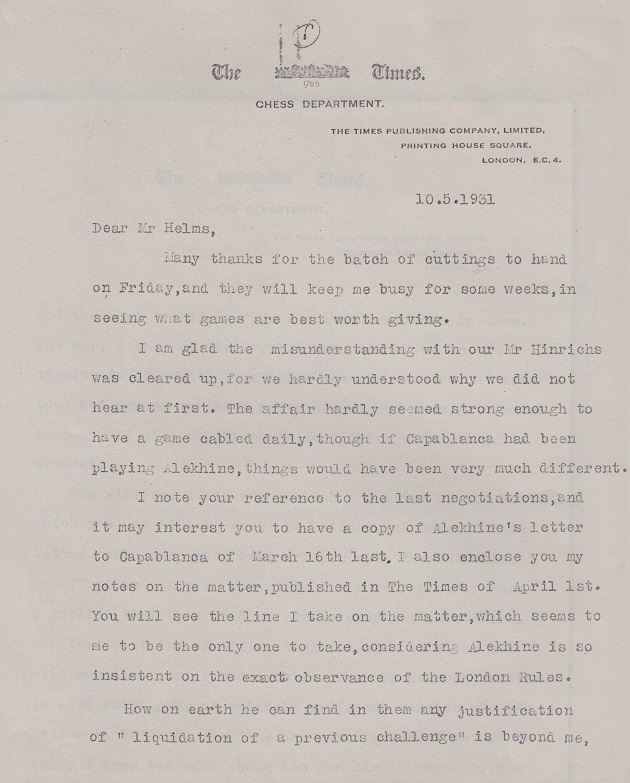
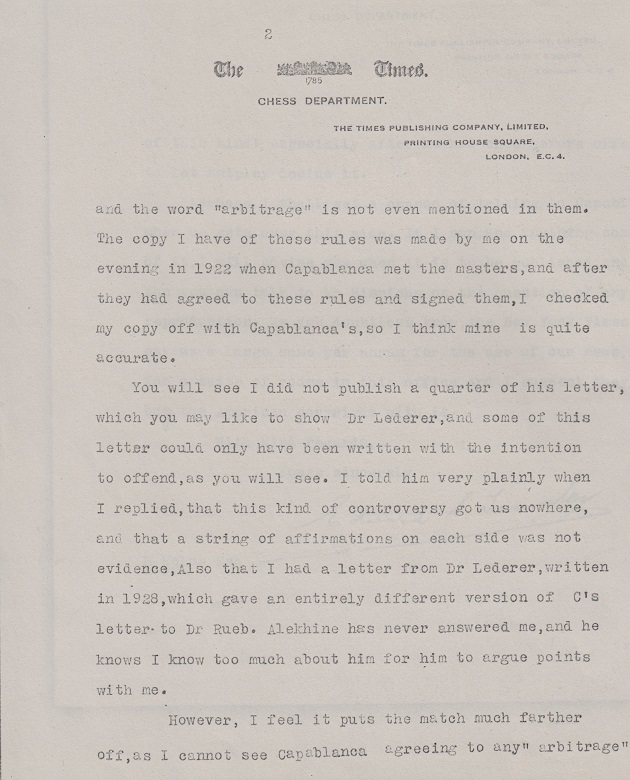
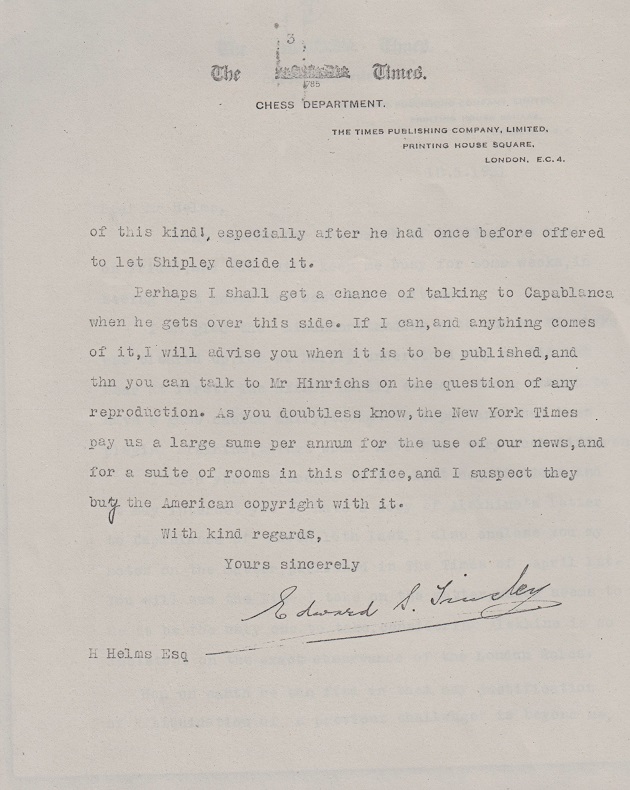
Alekhine’s letter of 16 March 1931 to Capablanca was given on pages 227-228 of our book on the Cuban. Below is the report on page 12 of The Times, 1 April 1931:

(9968)
See too G.H. Diggle, the Chess Badmaster.
Chess and Radio quotes, from two January 1926 issues of the Chess Budget, brief references to a British Broadcasting Company talk on chess by one of Edward Samuel Tinsley’s brothers, Samuel. We have now found a transcript, in an improbable place: the chapter entitled ‘The Indian Ocean’ in his travel book Across the World (London, 1937).
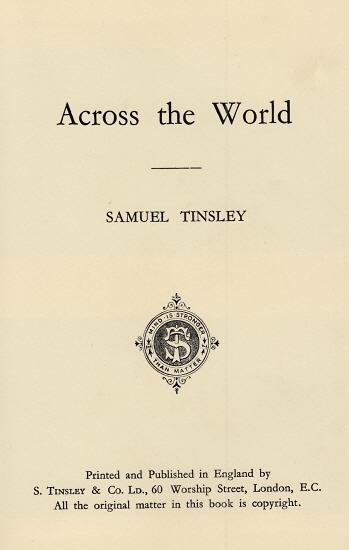
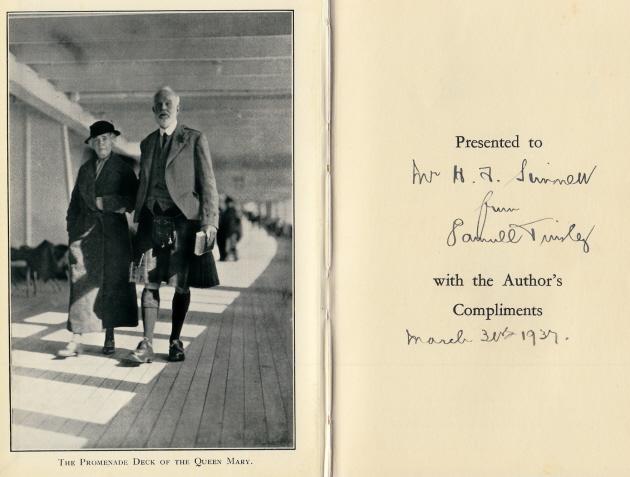
The full text:
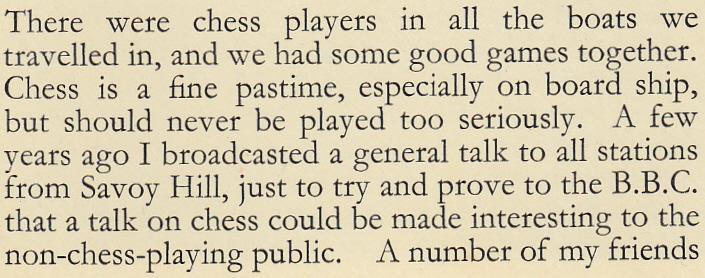
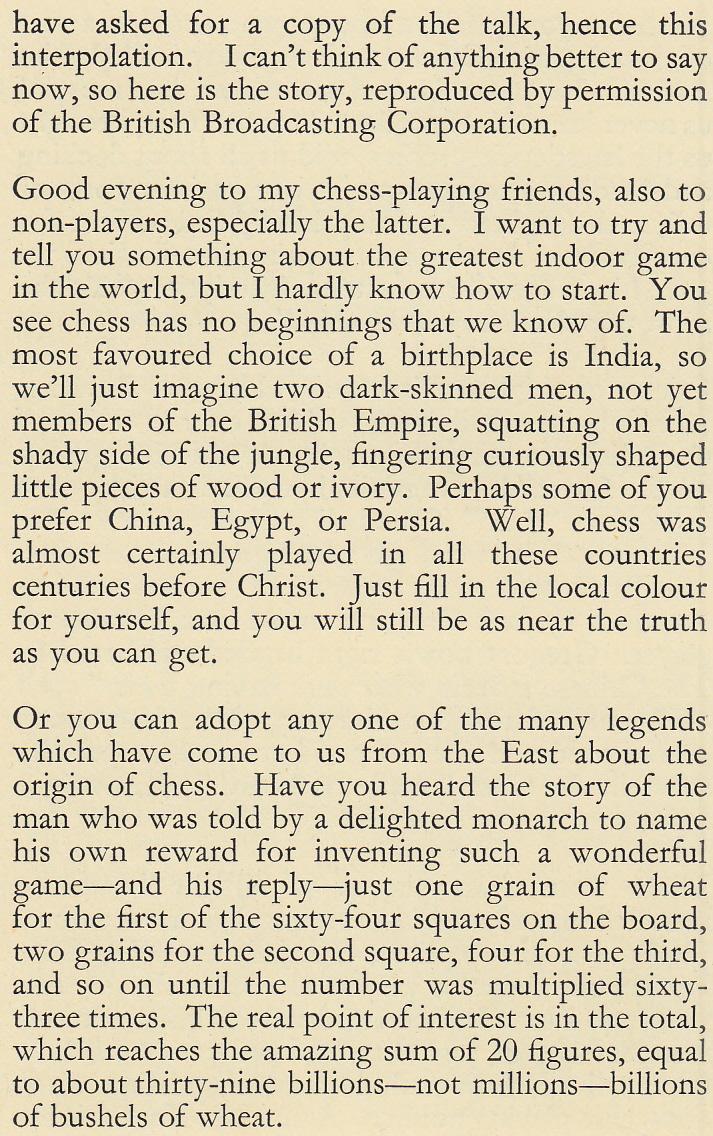
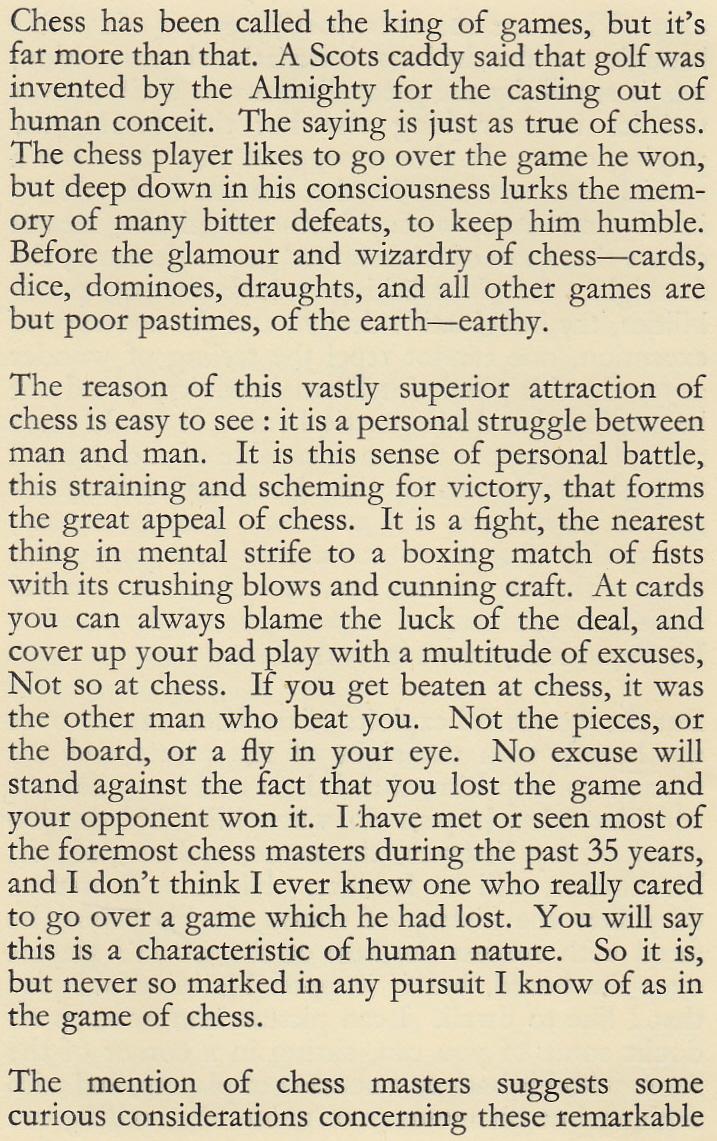
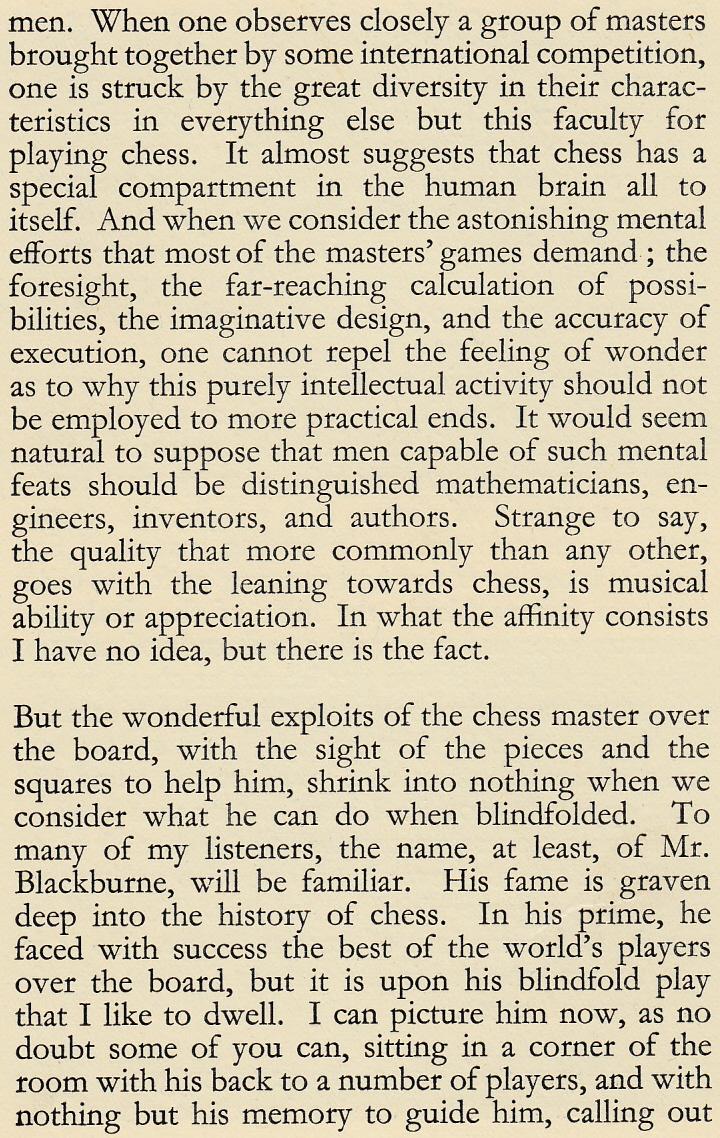
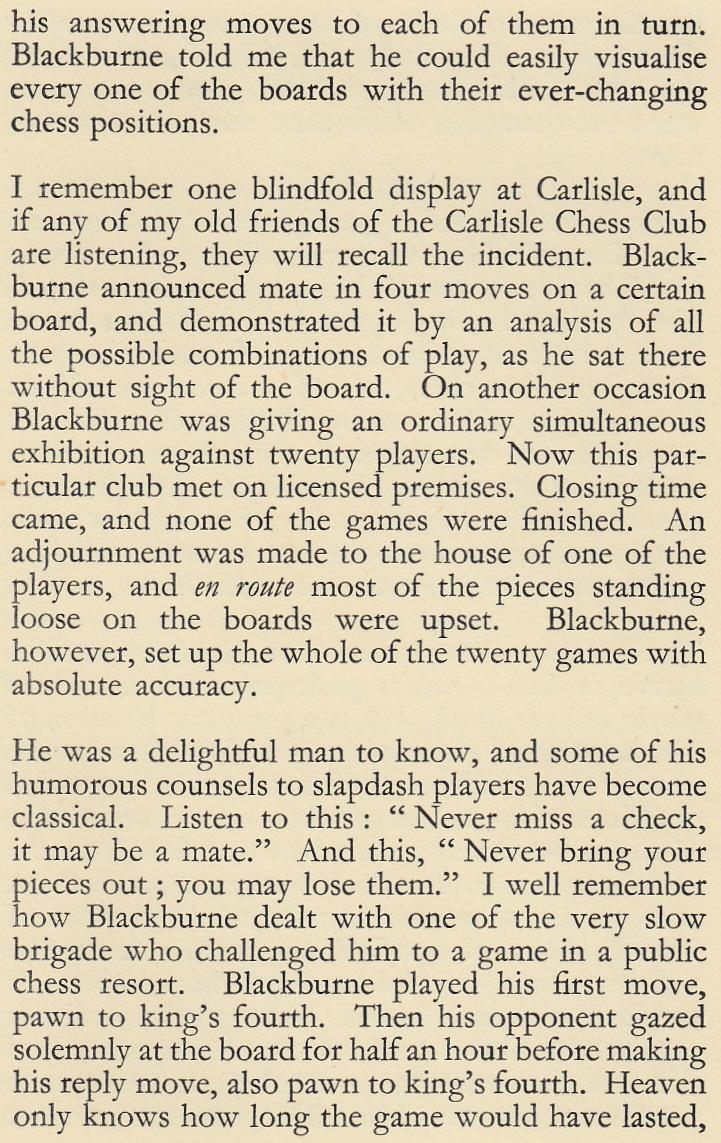
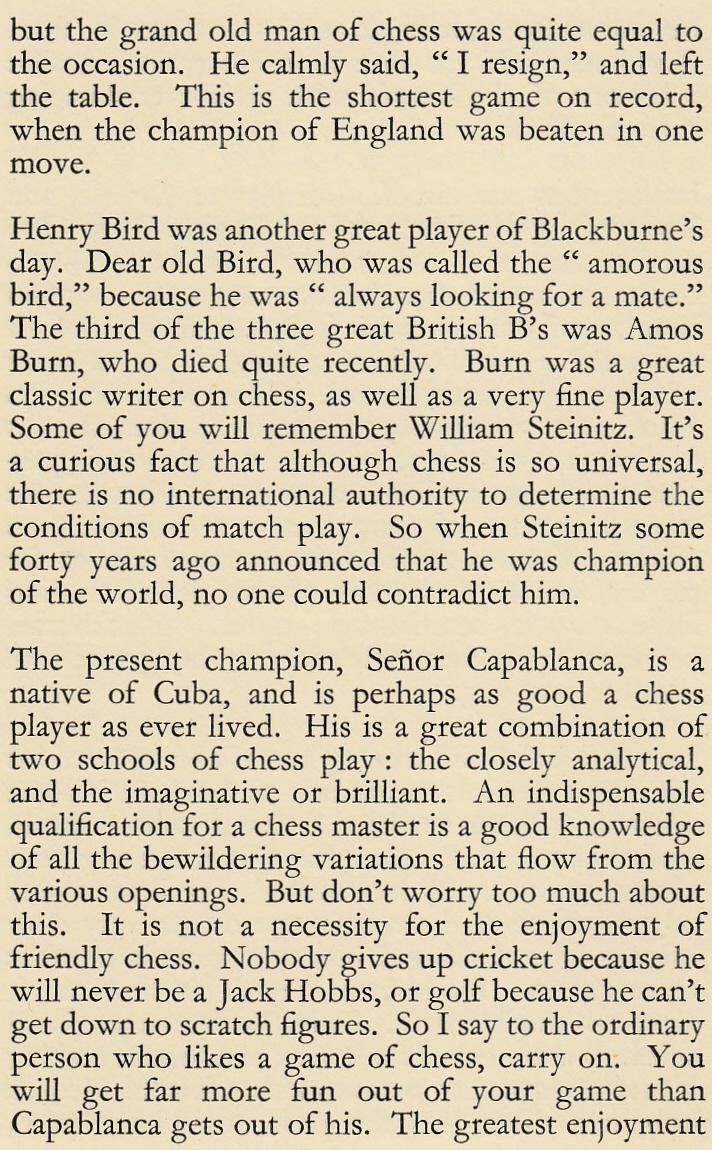
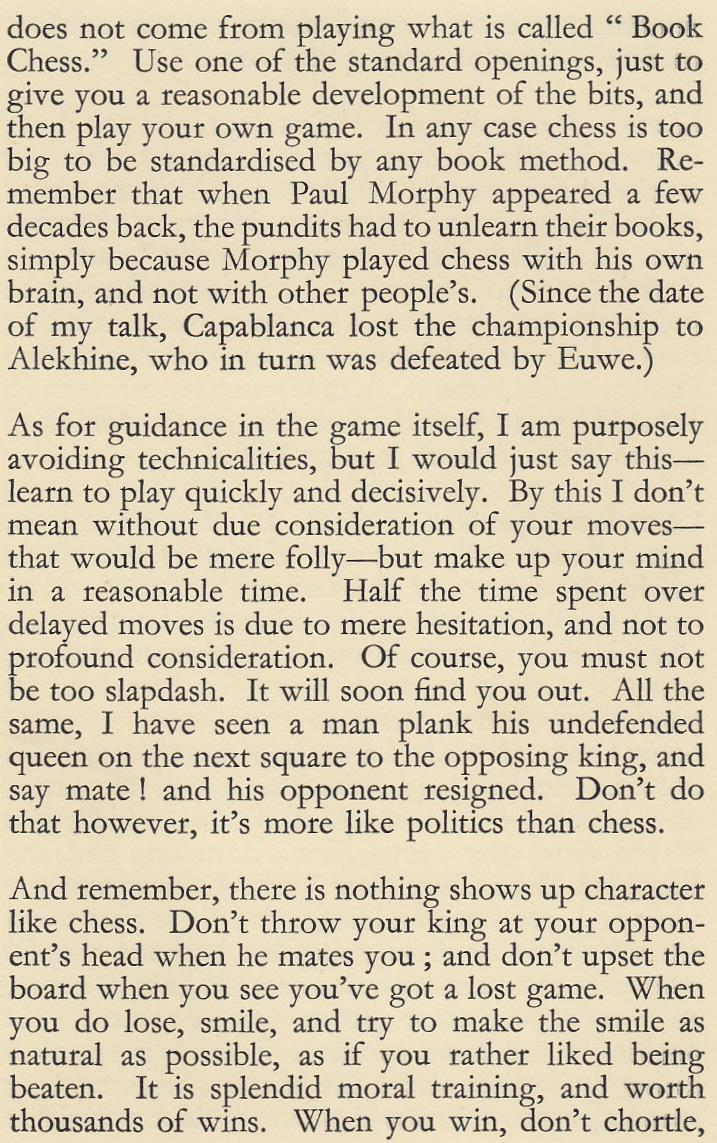
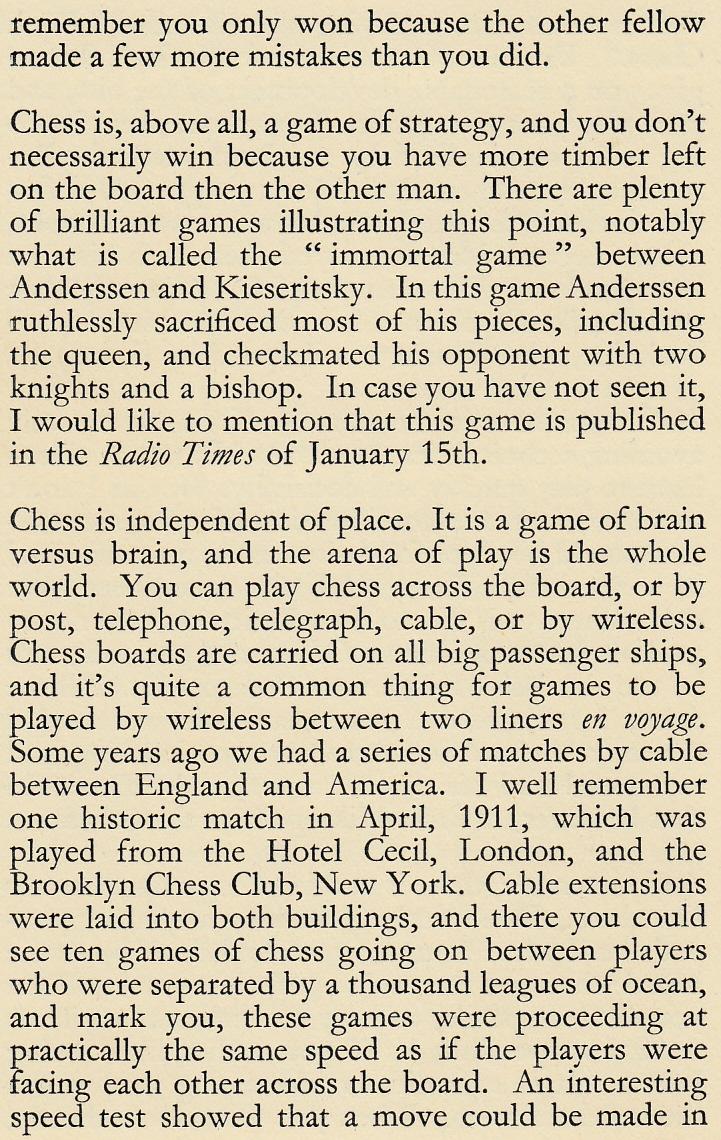
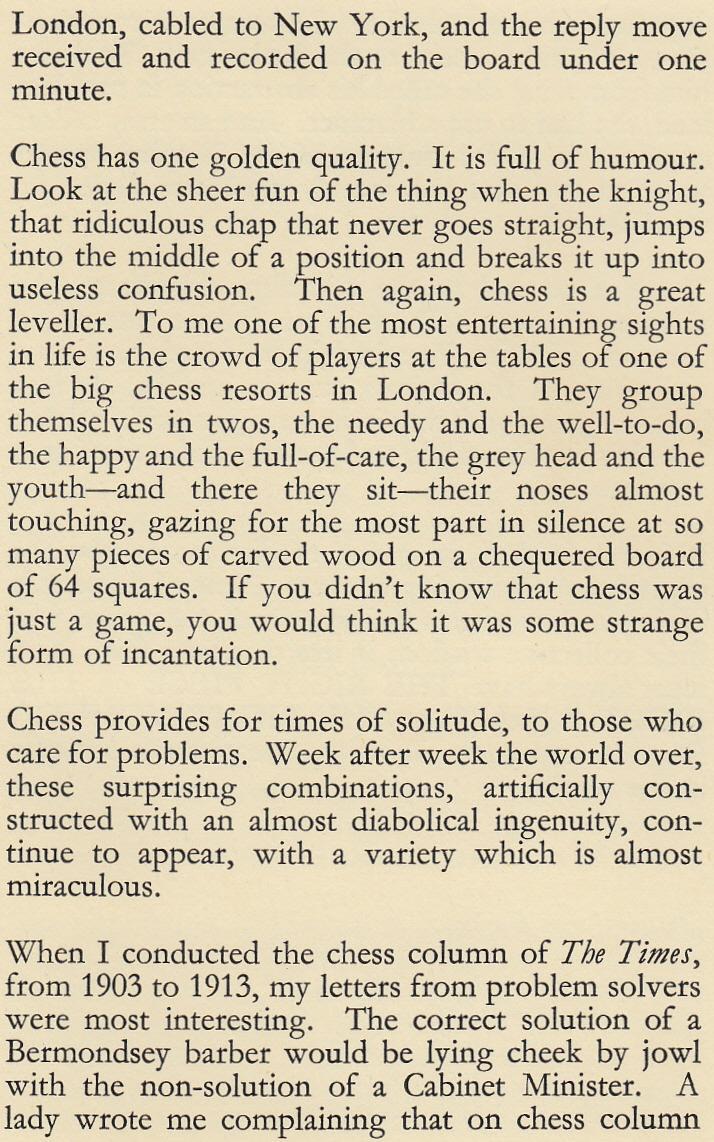
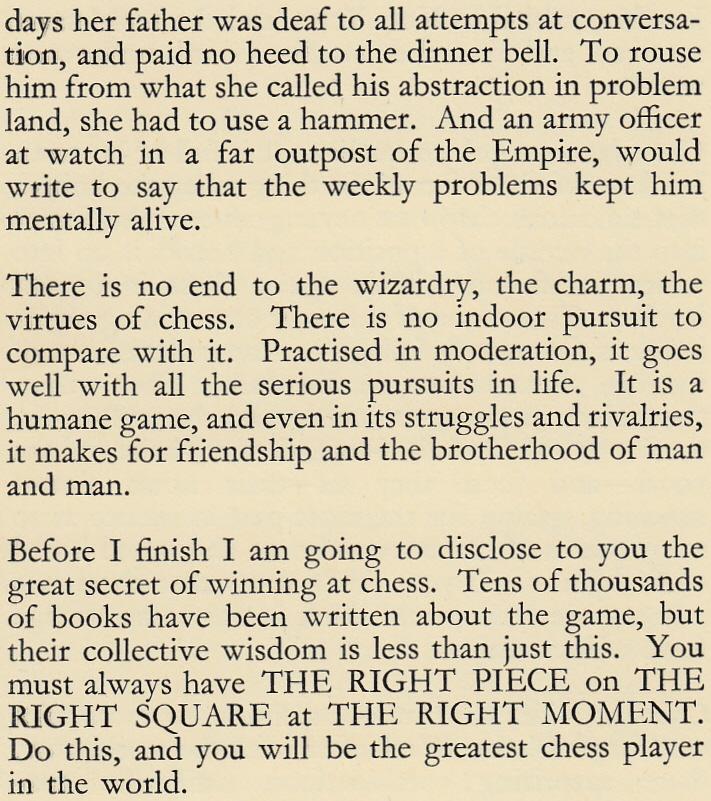
Some gleanings from the above pages (which were unnumbered):
(8725)
‘Politics is just a game in England today. Our leading men play it just as we play chess. There is very little consideration of Statesmanship or what is best for the Country and the Empire at large. The main question is the game – which move will best suit the scramble for place and power.’
Source: unnumbered page in the chapter ‘The Pacific Ocean’ in Across the World by Samuel Tinsley (London, 1937), the book discussed in C.N. 8725.
The photographs below of Tinsley and his wife are in the chapter on ‘The Dominion of New Zealand’:
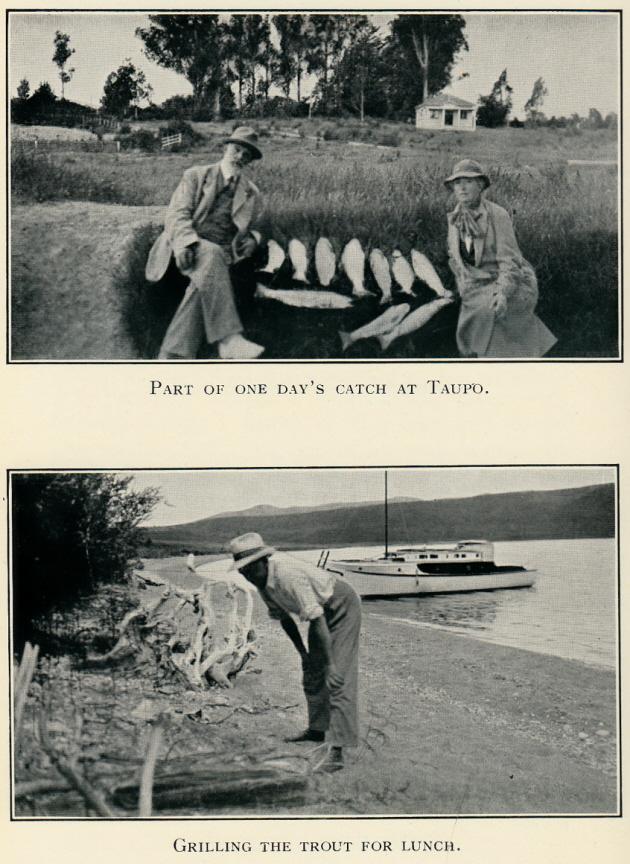
(8783)
David Abrams (Syracuse, NY, USA) notes a further reference to chess in the chapter entitled ‘The Pacific Ocean’:
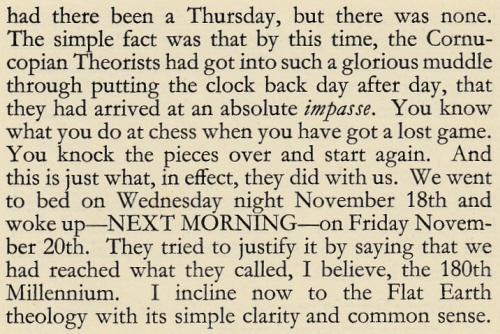
Below is the billing for Samuel Tinsley’s talk on chess (British Broadcasting Company, Saturday evening, 23 January 1926) in the programme schedule on page 157 of the Radio Times, 15 January 1926:
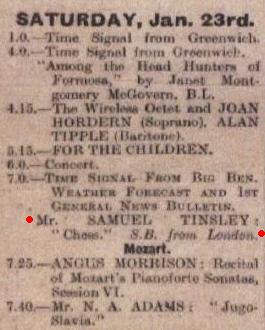
‘S.B.’ means simultaneous broadcast.
As shown in C.N. 8725, Tinsley mentioned in his talk that the Anderssen v Kieseritzky ‘Immortal Game’ was published in the same issue of the Radio Times. From page 148:
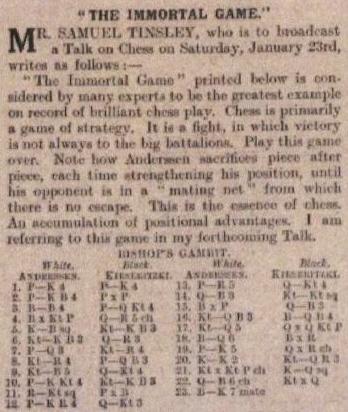
Permission to show the above material has been received from Immediate Media Company London Limited, the publishers of the Radio Times.
A photograph of Samuel Tinsley from his book Across the World (London, 1937):
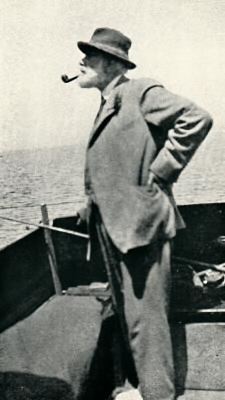
Can it be discovered when he died?
(8798)
From Across the World by Samuel Tinsley (London, 1937):
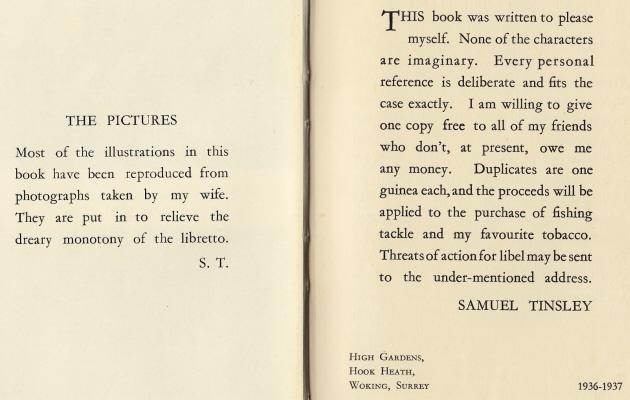
C.N. 8798 asked whether it could be discovered when Samuel Tinsley died, and we have now received the following from John Townsend (Wokingham, England):
‘That the second son of Samuel Tinsley (1847-1903) was Samuel Tinsley is confirmed in the marriages column of The Gentlewoman, 20 May 1905, page 3:
“Tinsley – Dobson. On 6 May, at the City Temple, London, by the Rev. G.S. Walker, of Stalybridge, Samuel Tinsley, second son of the late Mr Samuel Tinsley of Lewisham, to Marion, only daughter of Mr and Mrs Edward Dobson, of Sidcup.”
Page 10 of the Argus (Melbourne), 3 March 1939 had a brief pen-portrait of him:
“Likes Our Country
Most picturesque figure aboard when the Orcades sailed from Station Pier this week was Mr Samuel Tinsley, of Hook Heath, Woking, Surrey, former London journalist and retired publisher and printer.
Smiling blue eyes twinkled above a Bernard Shaw beard, and a tie and kilt of the McLaren tartan, while a leather sporran matched his Scotch brogues. Add to this a fistful of multi-coloured streamers and you have a picture of a grand old man who thinks that Australia is a wonderful country.
After spending three months in New Zealand and Australia principally fishing, he is going home convinced more than ever that the ‘colonies are solidly behind the mother country’, though he did not specify if that meant England or Scotland.”
Below is an entry for his will in the National Probate Calendar in 1945:
“Tinsley, Samuel of Fieldway Elm Bridge-lane Woking Surrey died 18 May 1945. Probate Llandudno 8 September to Marion Tinsley widow. Effects £15,747 5s. 1d.”
His age at the time of death is given as 73 in the General Register Office’s index to deaths (June 1945 quarter, Surrey N.W., 2a, 425).
His death was briefly noted in The Times of 19 May 1945, page 1:
“Tinsley – On 18 May 1945, at Fieldway, Woking, after a short illness, Samuel Tinsley passed peacefully away.”’
(8802)
To the Chess Notes main page.
To the Archives for other feature articles.
Copyright: Edward Winter. All rights reserved.